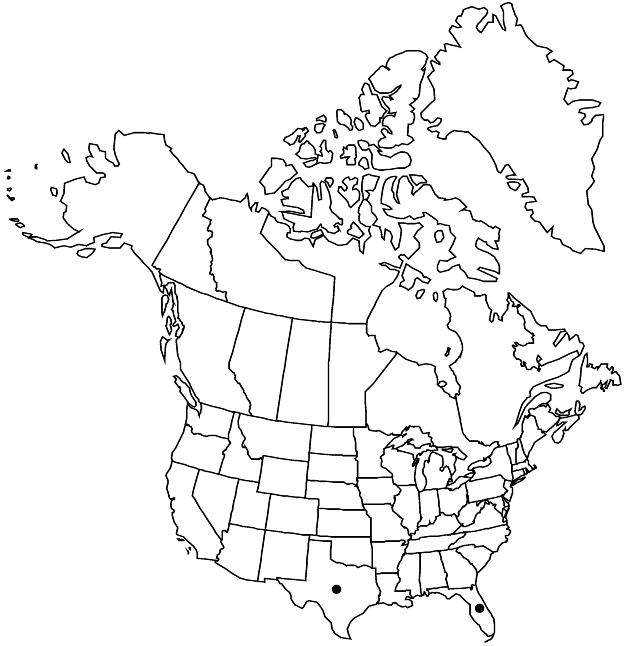Difference between revisions of "Sideroxylon celastrinum"
in Organization for Flora Neotropica, Fl. Neotrop. 52: 123. 1990,.
FNA>Volume Importer |
FNA>Volume Importer |
||
| Line 14: | Line 14: | ||
|name=Bumelia angustifolia | |name=Bumelia angustifolia | ||
|authority=Nuttall | |authority=Nuttall | ||
| − | }}{{Treatment/ID/Synonym | + | }} {{Treatment/ID/Synonym |
|name=Bumelia celastrina var. angustifolia | |name=Bumelia celastrina var. angustifolia | ||
|authority=(Nuttall) R. W. Long | |authority=(Nuttall) R. W. Long | ||
| Line 32: | Line 32: | ||
|elevation=0-100[-900] m | |elevation=0-100[-900] m | ||
|distribution=Fla.;Tex.;Mexico;West Indies;Central America;n South America. | |distribution=Fla.;Tex.;Mexico;West Indies;Central America;n South America. | ||
| − | |discussion=<p>Sideroxylon celastrinum is widespread in the Neotropics. It differs from other North American species of the genus by its glabrous twigs, leaves, pedicels, and sepals, and its narrowly ellipsoid fruits. The fruits are edible (T. D. Pennington 1990).</p> | + | |discussion=<p><i>Sideroxylon celastrinum</i> is widespread in the Neotropics. It differs from other North American species of the genus by its glabrous twigs, leaves, pedicels, and sepals, and its narrowly ellipsoid fruits. The fruits are edible (T. D. Pennington 1990).</p> |
|tables= | |tables= | ||
|references= | |references= | ||
| Line 56: | Line 56: | ||
|publication year= | |publication year= | ||
|special status= | |special status= | ||
| − | |source xml=https://jpend@bitbucket.org/aafc-mbb/fna-data-curation.git/src/ | + | |source xml=https://jpend@bitbucket.org/aafc-mbb/fna-data-curation.git/src/8f726806613d60c220dc4493de13607dd3150896/coarse_grained_fna_xml/V8/V8_490.xml |
|genus=Sideroxylon | |genus=Sideroxylon | ||
|species=Sideroxylon celastrinum | |species=Sideroxylon celastrinum | ||
Revision as of 18:07, 18 September 2019
Shrubs or trees, to 10 m. Stems armed, villous, glabrescent. Leaves deciduous; petiole 1–6.5 mm, glabrous; blade (dark green adaxially), broadly elliptic, obovate, oblanceolate, or spatulate, 6–38 × 3–23 mm, base attenuate to cuneate, margins plane, apex rounded to obtuse, surfaces glabrous, tertiary and smaller veins not prominent (inconspicuously reticulate), midrib flat, marginal vein present. Inflorescences 4–12-flowered. Pedicels 3–6 mm, glabrous. Flowers: calyx 1.8–3 mm diam.; sepals 5, 1.7–3 × 0.9–1.9 mm, glabrous; petals 5(–6), white to yellowish, median segment elliptic, 1.9–2.3 mm, lateral segments lanceolate, 1.3–2.3 mm; stamens 5(–6), 2.2–2.9 mm; staminodes lanceolate, 1.7–2.1 mm, minutely erose; anthers lanceolate, 0.7–1 mm; pistil 5-carpellate; ovary 5-locular, 0.9–1.3 mm, hirsute to strigose basally; style 2.2–2.8 mm. Berries purple to purplish black, ellipsoid, 8–12 mm, glabrous. Seeds 6–11 mm.
Phenology: Flowering May–Nov.
Habitat: Scrub thickets, coastal marshes and hammocks
Elevation: 0-100[-900] m
Distribution

Fla., Tex., Mexico, West Indies, Central America, n South America.
Discussion
Sideroxylon celastrinum is widespread in the Neotropics. It differs from other North American species of the genus by its glabrous twigs, leaves, pedicels, and sepals, and its narrowly ellipsoid fruits. The fruits are edible (T. D. Pennington 1990).
Selected References
None.